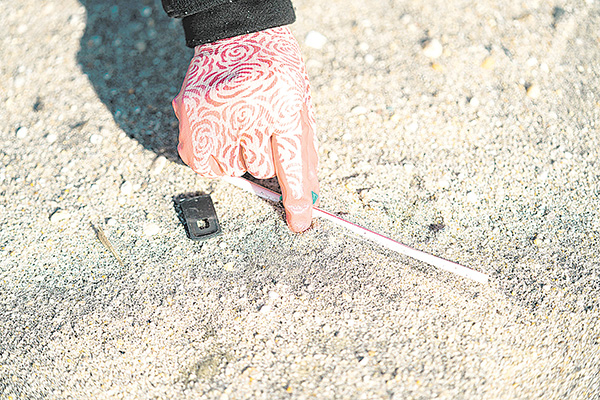
By Mia Glass
The straw that you sip your morning iced coffee from, the toothbrush in your bathroom, the bottle of water you drink every day and the bag you carry around at the supermarket – all seemingly small objects that are creating big trouble for the planet.
Plastic use is a ubiquitous problem; from schools to businesses to individual homes, people are choosing to buy products that have a single use but last for a very long time on the Earth. These products are so readily available people often don’t realize their effects. That is why the Plastic Free Foundation hosts Plastic Free July, a global campaign to reduce plastic waste and better the environment.
Since 2011, Plastic Free July has challenged consumers to forgo products containing plastic for the month and beyond. It is an especially important issue for those who live in the Two River area. A quick stroll on the beach reveals how much of that plastic winds up in local waterways and the ocean.
“The ocean is becoming the giant trash can for all of the plastic that has made its way there,” said Cindy Zipf, executive director of Clean Ocean Action.
Some local governments are already paving the way for a plastic-free environment by banning single-use plastic in their towns. Monmouth Beach was the first to have a comprehensive ordinance in 2018 and other beach towns soon followed. Sea Bright, one of the most recent additions, gave its businesses a grace period before implementing its new policies.
“We know every restaurant, every convenience store, we have a pretty good handle on our small town. They were all given plenty of notice, given the timing of it and the transition. We wanted to make sure it was reasonable,” said Mayor Brian Kelly of Sea Bright about the ordinance banning single-use plastic.
Woody’s, a restaurant in Sea Bright, made sure its to-go containers and straws complied with the new regulations that went into effect in January.
“It’s pretty easy, just sourcing out the proper biodegradable materials that work well for packaging,” said manager Chadwick Alvis.
Both Kelly and Alvis felt that this was a step in the right direction and that all towns should work toward banning single-use plastic.
Plastic Free July’s challenges emphasize everyday approaches to get involved in the movement. If people want to start smaller than going directly to their governments, they can choose to shop at stores that are more sustainable.
At Currant, which houses a general store and coffee shop in Red Bank, shoppers can do just that. Owner Danielle Glazman has not only been giving tips for Plastic Free July, but has made sure her business has sold sustainable products since the day it opened its doors.

“I went to school in Vermont and I did take environmental studies classes, but I think just living there instilled in me that, ‘Why should something that you’re going to use for the shortest amount of time be made out of plastic?’ ” explained Glazman.
The coffee bar uses agave straws, a byproduct of tequila, as well as compostable cups and napkins. The store also sells ethical and environmentally friendly essentials such as home goods and apparel. As these are all products that people use daily, Glazman hopes to inspire more sustainable habits within the community.
“Start small in areas that you feel will give you a victory and will inspire you to do other things. You can start with your kitchen sink area and choose sponges that are not plastic and containers that you can refill for your dish soap,” she said.
Local organizations such as Clean Ocean Action and the American Littoral Society are at the front lines in the fight against plastic, advocating for the planet every day. They support Plastic Free July’s mission and are doing everything they can to spread information about the issue.
“It’s a gateway of opportunity to bring awareness to people. Since Plastic Free July is a month long, hopefully people will get in the habit of living life a little more plastic free. It’s more challenging to say I’m going to stop using all plastic tomorrow. It’s more sustainable to say I’m going to take one item a month,” said Zipf.
Nicole Haines, the education director of the American Littoral Society, hosts workshops every month to educate people on different environmental concepts. For July, she is including a segment on Plastic Free July and the harmful effects of plastic on local habitats. This virtual workshop will take place July 15 and anyone can sign up through the organization’s website.
Both organizations believe that Plastic Free July is more important than ever, with plastic use dramatically increasing due to people’s wariness at the prospect of using reusable products such as tote bags, cups and containers during the current health crisis.
“Towns are being inundated now with a huge influx of garbage because of the plastic takeout containers. It’s a challenging time because people are looking for materials that they believe to be more sanitary,” said Zipf.
Although the brief reversal of plastic reduction efforts due to the virus is unfortunate, these organizations are hopeful that movements such as Plastic Free July and increased awareness will help save the Earth.
“As we learn more and research more, I think that we will become more informed and go back to using our reusables,” said Haines.
Amidst these uncertain times, one thing is certain – Plastic Free July and its principles are crucial to keeping communities beautiful. From individuals’ changing day-to-day habits to local committees and governments working toward secure legislation, the Earth relies on its inhabitants’ efforts.
“We all depend on this amazing marvel of a blue planet to survive and that’s something that we all share and need to have as a priority,” said Zipf.
The article originally appeared in the July 9 – 15, 2020 print edition of The Two River Times.














